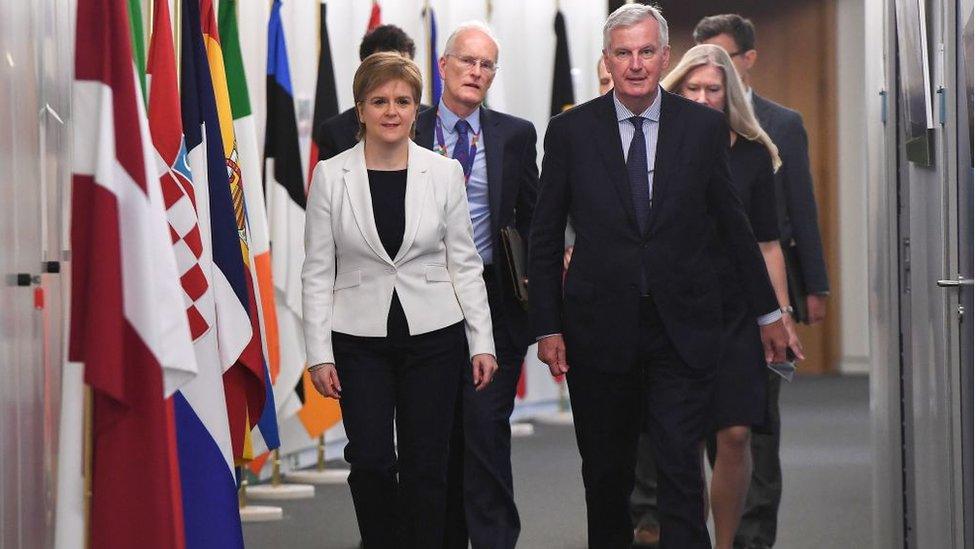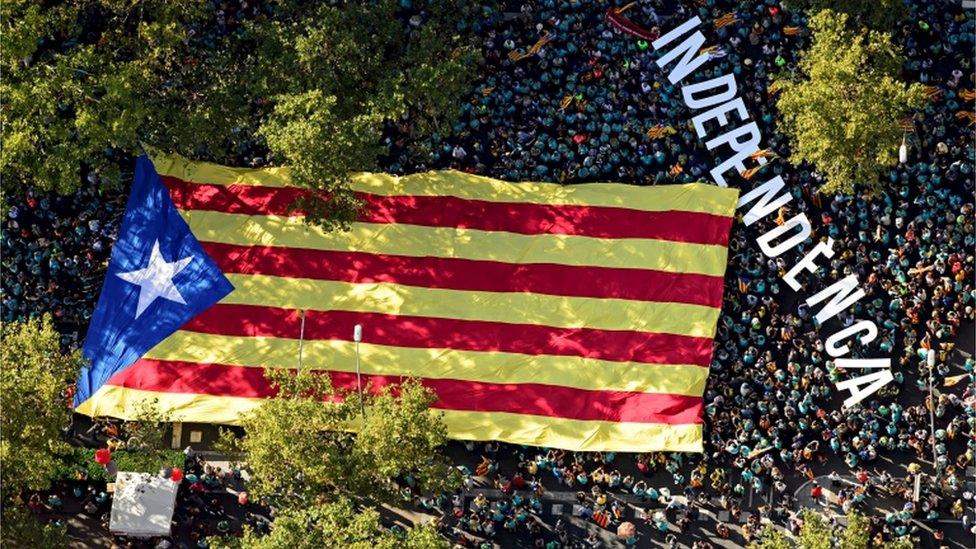Herman Van Rompuy says Brexit 'has changed EU view of Scotland'
- Published
Van Rompuy: Europe 'looking at what Scotland is in favour of'
A former president of the European Council has said he believes Brexit has changed EU attitudes to Scottish independence.
In a BBC interview, Herman Van Rompuy said there was now "much more sympathy" for European regions seeking EU membership.
Mr Van Rompuy said the process of joining the EU was "complicated".
But he said an application from Scotland would have to be "very seriously" considered.
The UK government does not support Scottish government calls for another independence referendum.
On 18 September, it will be five years since Scotland voted 55% to 45% against becoming an independent country.
At that time, SNP leaders said it was a "once in a generation" referendum but they have since argued that Brexit fundamentally changes the circumstances.
This is because the 2016 EU referendum saw the UK as a whole vote to leave, while Scottish voters backed remain by 62% to 38%.

Scotland voted 55% to 45% against becoming an independent country in September 2014
Mr Van Rompuy said that the UK's decision to leave the EU had certainly altered European attitudes to Scottish independence.
He said: "I think there is a change, yes, because for a lot of people they are looking at what Scottish people are in favour of.
"They want to stay in the European Union and at the same time they are prevented to stay in the European Union."
The Scottish government's Brexit Secretary, Mike Russell, said the comments were "welcome" and that an independent Scotland had a "strong contribution" to make to the EU.
However, The Scottish Secretary in the UK government, Alister Jack, said Scotland was "better served" in the UK, rather than joining the EU and "giving away" democratic and fishing rights.

Mr Van Rompuy said there was more sympathy for regions of a country that wanted to join the EU
Mr Van Rompuy said there was not much sympathy for Brexit in the EU among political leaders or the man or woman in the street.
He added: "There is much more sympathy for regions - parts of a country - that want to join the European Union."
Political dimension
Mr Van Rompuy - who chaired EU summits between 2009 and 2014 before handing over to Donald Tusk - said any indyref2 must be agreed with the UK.
If there was a Yes vote in a referendum that was "constitutional" he said Scotland would have a "legal case".
"Then, of course the outcome has to be considered by the European Union very seriously," he said.
But Mr Van Rompuy pointed out there was also a political dimension - and that all 27 EU countries would have to consent.
He said: "There is no automaticity, there are rules to be respected and we have all to agree on a new candidate."
Mr Van Rompuy said there were still "hesitations" about Scottish independence in Spain, which is concerned about Catalonia breaking away.
He added: "It is a complicated process. Even leaving the UK is a complicated process - as complicated as Britain leaving the European Union."

Mr Van Rompuy said the situation in Scotland was very different to the one in Catalonia
As a former prime minister of Belgium, which has a Flemish nationalist movement, he is not personally enthusiastic about the UK breaking up.
"I fought all my life against separatism in my own country, so don't ask me to applaud when this would happen," he said.
Mr Van Rompuy has previously warned that leaving the EU without a deal would pose an "existential threat" to the UK.
In his BBC Scotland interview, he said UK politicians "take risks not only for the prosperity of the British people but also for the unity of the United Kingdom".
Special treatment
Alister Jack, the Scottish Secretary, said: "I would say Scotland's place is better served staying in the United Kingdom rather than leaving the UK, joining the EU and giving away both democratic rights and also our coastal fisheries which will be of great value to us".
However, the Scottish government's Brexit Secretary Mike Russell said: "There is clearly real sympathy and understanding for Scotland's position in Europe, particularly given the hard-line anti-EU position of the UK government."
The European Policy Centre think-tank, of which Mr Van Rompuy is president, recently published an analysis on independent Scottish membership of the EU.
It concluded that the EU should "engage positively" with Scotland in the event of independence, if there had been a properly constituted referendum.
But it said Scotland could not expect "special treatment" and that the Scottish government would have to accept all the obligations of membership, including agreeing in principle to join the euro.
Has Brexit changed opinions on Scottish independence?
The paper was produced by the centre's chief executive, Fabian Zuleeg, who also serves as an adviser to the Scottish government on Europe.
He notes that the EU institutions were "rather negative" towards Scottish independence in 2014, partly due to concerns about encouraging secessionist movements in other EU countries.
At that time, the president of the European Commission, Jose Manuel Barosso, said it would be "extremely difficult, if not impossible" for Scotland to secure EU membership.
'Third country'
Mr Van Rompuy was also perceived to cast doubt on independent Scottish membership of the EU when he made comments about Catalonia.
But the former EU Council chief is clear that there is a "big difference" between the cases of Catalonia and Scotland.
In his view, it would be "unthinkable" for Catalonia to be considered for EU membership because its referendum is regarded as illegal by Spain.
Scotland, he said, would be treated "otherwise" if it had a legally-agreed referendum.
He also warned the UK that it would not enjoy the same solidarity the EU had afforded it in 2014 in the event of another Scottish referendum.
"If the UK is not a member of the European Union anymore, what kind of solidarity are you speaking about?" Mr Van Rompuy said.
Asked if solidarity with the UK would no longer exist, he said: "no, it's a third country".